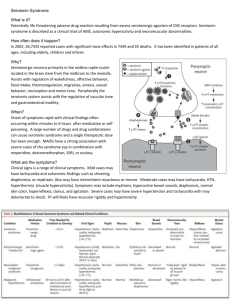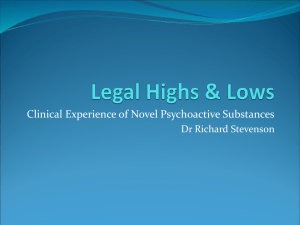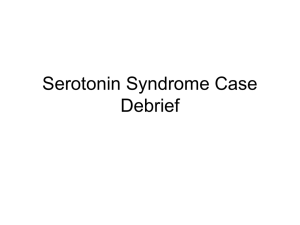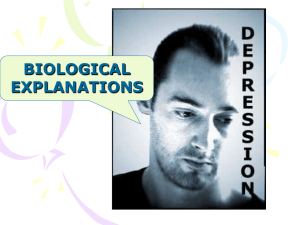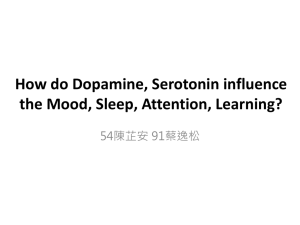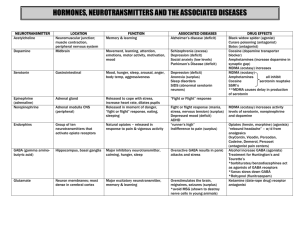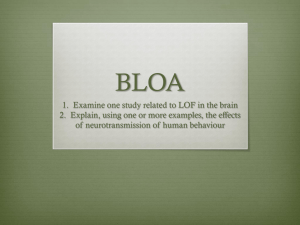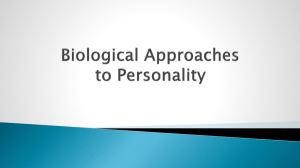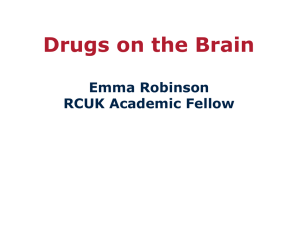expecting punishment: how serotonin affects response
advertisement
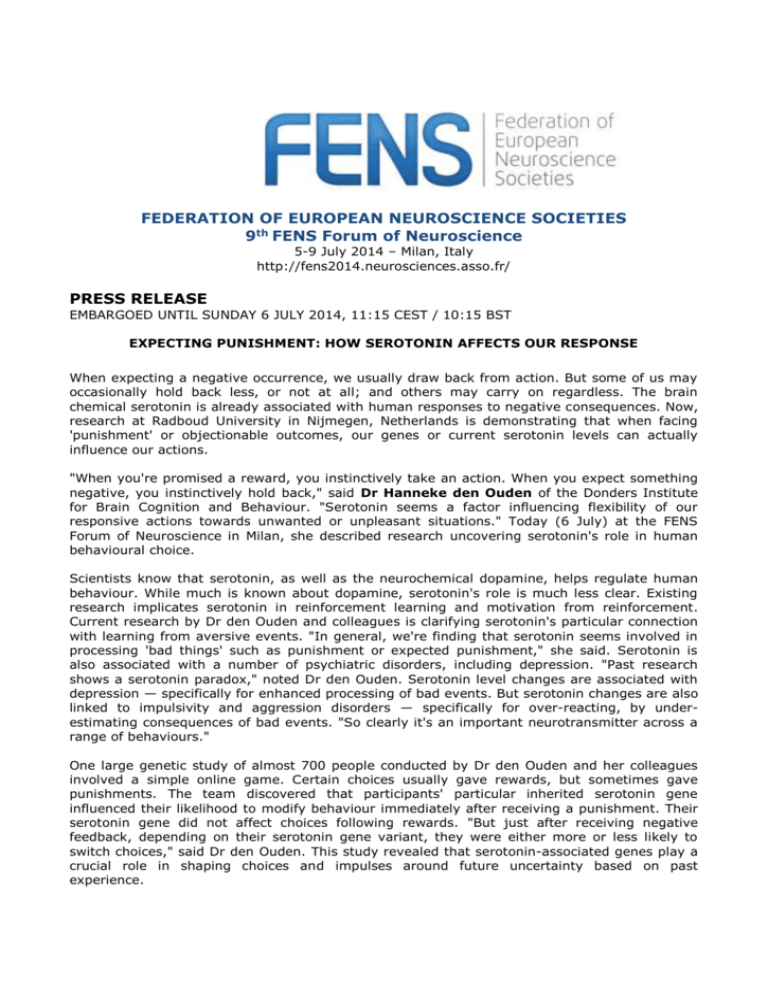
FEDERATION OF EUROPEAN NEUROSCIENCE SOCIETIES 9th FENS Forum of Neuroscience 5-9 July 2014 – Milan, Italy http://fens2014.neurosciences.asso.fr/ PRESS RELEASE EMBARGOED UNTIL SUNDAY 6 JULY 2014, 11:15 CEST / 10:15 BST EXPECTING PUNISHMENT: HOW SEROTONIN AFFECTS OUR RESPONSE When expecting a negative occurrence, we usually draw back from action. But some of us may occasionally hold back less, or not at all; and others may carry on regardless. The brain chemical serotonin is already associated with human responses to negative consequences. Now, research at Radboud University in Nijmegen, Netherlands is demonstrating that when facing 'punishment' or objectionable outcomes, our genes or current serotonin levels can actually influence our actions. "When you're promised a reward, you instinctively take an action. When you expect something negative, you instinctively hold back," said Dr Hanneke den Ouden of the Donders Institute for Brain Cognition and Behaviour. "Serotonin seems a factor influencing flexibility of our responsive actions towards unwanted or unpleasant situations." Today (6 July) at the FENS Forum of Neuroscience in Milan, she described research uncovering serotonin's role in human behavioural choice. Scientists know that serotonin, as well as the neurochemical dopamine, helps regulate human behaviour. While much is known about dopamine, serotonin's role is much less clear. Existing research implicates serotonin in reinforcement learning and motivation from reinforcement. Current research by Dr den Ouden and colleagues is clarifying serotonin's particular connection with learning from aversive events. "In general, we're finding that serotonin seems involved in processing 'bad things' such as punishment or expected punishment," she said. Serotonin is also associated with a number of psychiatric disorders, including depression. "Past research shows a serotonin paradox," noted Dr den Ouden. Serotonin level changes are associated with depression — specifically for enhanced processing of bad events. But serotonin changes are also linked to impulsivity and aggression disorders — specifically for over-reacting, by underestimating consequences of bad events. "So clearly it's an important neurotransmitter across a range of behaviours." One large genetic study of almost 700 people conducted by Dr den Ouden and her colleagues involved a simple online game. Certain choices usually gave rewards, but sometimes gave punishments. The team discovered that participants' particular inherited serotonin gene influenced their likelihood to modify behaviour immediately after receiving a punishment. Their serotonin gene did not affect choices following rewards. "But just after receiving negative feedback, depending on their serotonin gene variant, they were either more or less likely to switch choices," said Dr den Ouden. This study revealed that serotonin-associated genes play a crucial role in shaping choices and impulses around future uncertainty based on past experience. Another study led by Dirk Geurts and Professor Roshan Cools investigated serotonin's role in inhibition. The team examined 'aversive bias' — a natural restraining response towards expected punishment or negative events. "We're hard-wired that when we see something appealing or rewarding, we approach it. But when we see something negative or threatening, we stay away or even retreat," explained Dr den Ouden. "We asked whether serotonin is involved in the instant of that inhibition of our responses." A computer game required pressing a button to be rewarded or to avoid punishment. "One's automatic choice is to press a button more when expecting positive effects, and to press it less expecting negative effects," noted Dr den Ouden. In the background, positive or negative pictures were shown. Positive images influenced participants to press buttons more; and negative images, to press less. "Independent images should be irrelevant, but automatic conditioning informs our behaviour nevertheless." But when some participants' serotonin levels were lowered via an amino acid drink, the influence of negative pictures vanished. As their inhibition disappeared, participants pressed buttons the same number of times as before the negative images appeared. "So low serotonin stopped people from not pressing the button," explained Dr den Ouden. "In other words, low serotonin seems to remove our inhibition to negative events." These findings clarify serotonin's link to behavioural choice, suggesting that low levels affect disinhibition and thus impulsivity. "Serotonin seems indicated in our ability to respond 'appropriately' when something bad is about to occur. Perhaps serotonin allows us to inhibit responding excessively to bad events," noted Dr den Ouden. These implications could offer perspective on how serotonin levels might affect disorders associated with behavioural impulsivity and aggression. Ongoing research by her team in the lab of prof. Cools is using imaging to identify which brain areas allow people to overcome automatic 'aversive bias' when performing counter-intuitive actions — such as refraining from action to get a reward, or taking action to avoid punishment. "When reward and punishment situations are reversed, choices feel difficult," she noted. "We're investigating which brain areas activate during these responses, and how serotonin levels might affect these mechanisms." Taken together, this research area clarifies that serotonin genes and levels influence our sensitivity, expectations, and responses to punishment. Varied psychiatric disorders linked to serotonin — including depression, anxiety disorders, obsessive compulsive disorder (OCD), impulsivity, and aggression — involve varied types of reduction in flexible behaviour. Dr den Ouden hopes further investigation might unravel how depression correlates with impulsiveness or aggression, and how genes might make some people more vulnerable. She believes that ongoing research may further clarify serotonin's relationship with behavioural choice, and the mechanisms underlying these disorders. END Abstract Reference R10256: The dark side of the coin: serotonin at the interface of aversion and inhibition Symposia S08: The hedonistic brain: learning, predicting and decision making Contact FENS Press Office and all media enquiries: Elaine Snell, Snell Communications Ltd, London UK (English language) tel: +44 (0)20 7738 0424 or mobile +44 (0)7973 953 794 email: Elaine@snell-communications.net Mauro Scanu (Italian language) tel: +39 333 161 5477 email: press.office@fens.org Dr Hanneke den Ouden h.denouden@donders.ru.nl NOTES TO EDITORS The 9th FENS Forum of Neuroscience, the largest basic neuroscience meeting in Europe, organised by FENS and hosted by the The Società Italiana di Neuroscienze (SINS) (Italian Society for Neuroscience) will attract an estimated 5,500 international delegates. The Federation of European Neuroscience Societies (FENS), founded in 1998, aims to advance research and education in neuroscience, representing neuroscience research in the European Commission and other granting bodies. FENS represents 42 national and mono-disciplinary neuroscience societies with close to 23,000 member scientists from 32 European countries. http://fens2014.neurosciences.asso.fr/ Further Reading (den Ouden) Dissociable Effects of Dopamine and Serotonin on Reversal Learning. HEM den Ouden, ND Daw, G Fernandez, JA Elshout, M Rijpkema, M Hoogman, B Franke, R Cools. Neuron. 2013; Volume 80, Issue 4: 1090-1100. DOI: 10.1016/j.neuron.2013.08.030 Serotonin and Aversive Pavlovian Control of Instrumental Behavior in Humans. DEM Geurts, QJM Huys, HEM den Ouden, R Cools. Journal of Neuroscience. 2013; 33(48): 18932–18939. DOI: 10.1523/JNEUROSCI.2749-13.2013
